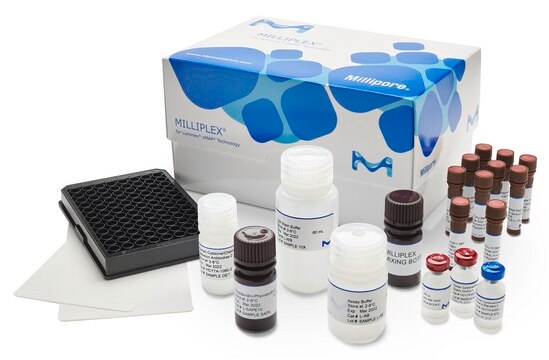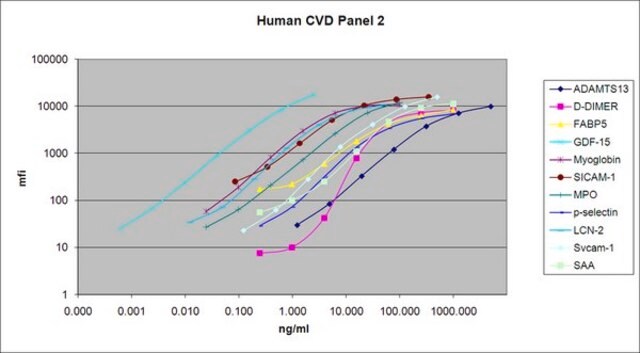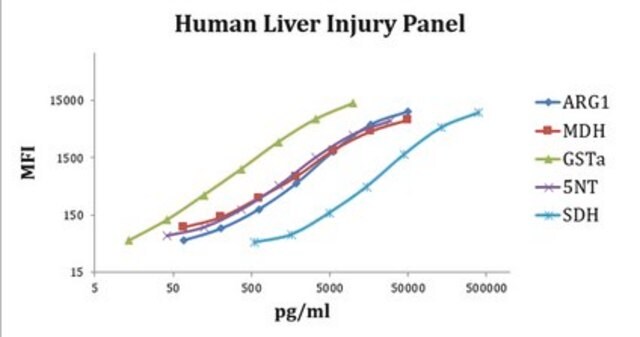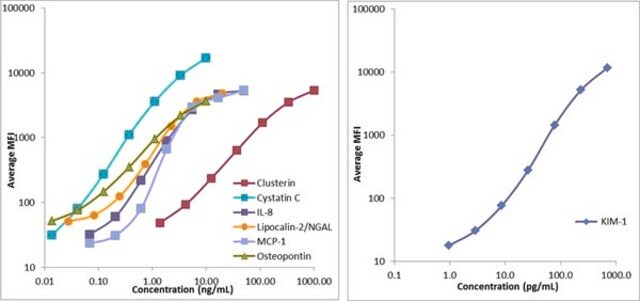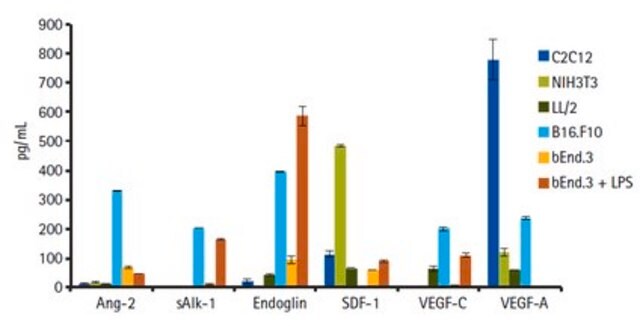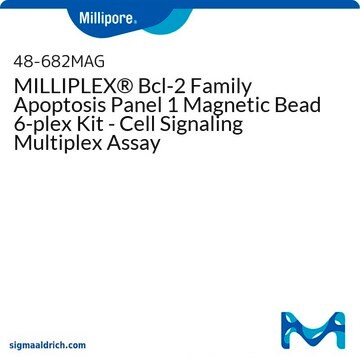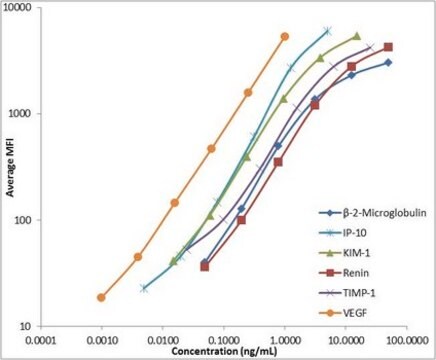HKI6MAG-99K
MILLIPLEX® Human Kidney Injury Magnetic Bead Panel 6 - Toxicity Multiplex Assay
The analytes available for this multiplex kit are: β-2-Microglobulin (β2M), Clusterin, Cystatin C, RBP4.
About This Item
Recommended Products
Quality Level
species reactivity
human
manufacturer/tradename
Milliplex®
assay range
accuracy: 103-133%
intra-assay cv: <10
sensitivity: 0.10-3.42 ng/mL
(MinDC+2SD)
standard curve range: 0.05-50 ng/mL
(β-2-Microglobulin (β2M))
standard curve range: 0.10-100 ng/mL
(RBP4)
standard curve range: 0.59-600 ng/mL
(Cystatin C)
standard curve range: 2.93-3,000 ng/mL
(Clusterin)
technique(s)
multiplexing: suitable
detection method
fluorometric (Luminex xMAP)
shipped in
wet ice
General description
The MILLIPLEX® portfolio provides valuable research assays to investigate multiple biomarkers of kidney injury in human serum and plasma samples using the [Luminex® xMAP® instrument platform.
The MILLIPLEX® Human Kidney Injury Bead Panel 6 contains all the components necessary to measure the following four biomarkers in any combination using [Luminex® xMAP® technology: β-2-Microglobulin (β2M), Clusterin, Cystatin C, RBP4. The kit uses a 96-well format, contains a lyophilized standard cocktail, two quality controls and can measure up to 38 serum or plasma samples in duplicate.
Panel Type: Toxicity
Specificity
There was no or negligible cross-reactivity between the antibodies for an analyte and any of the other analytes within a panel.
Application
- Analytes: β-2-Microglobulin (β2M), Clusterin, Cystatin C, RBP4
- Recommended Sample type: serum and plasma
- Recommended Sample dilution: 1:3,000 in kit Assay Buffer. Customers should determine the optimal dilution factor for their samples. Our recommendations are based on serum and plasma samples from normal subjects.
- Assay Run Time: Overnight
- Research Category: Toxicity
Features and Benefits
Packaging
Storage and Stability
Other Notes
Legal Information
Disclaimer
signalword
Danger
Hazard Classifications
Acute Tox. 3 Dermal - Acute Tox. 4 Inhalation - Acute Tox. 4 Oral - Aquatic Chronic 2 - Eye Dam. 1 - Skin Sens. 1 - STOT RE 2
target_organs
Respiratory Tract
Storage Class
6.1C - Combustible acute toxic Cat.3 / toxic compounds or compounds which causing chronic effects
Certificates of Analysis (COA)
Search for Certificates of Analysis (COA) by entering the products Lot/Batch Number. Lot and Batch Numbers can be found on a product’s label following the words ‘Lot’ or ‘Batch’.
Already Own This Product?
Find documentation for the products that you have recently purchased in the Document Library.
Related Content
Novel kidney toxicity biomarkers expand options for acute nephrotoxicity detection. Multiplex assays measure multiple renal damage biomarkers in small sample volumes, minimizing time and costs. See how MILLIPLEX® multiplex kidney toxicity assays detected vancomycin-induced subacute nephrotoxicity in rat models.
Exploring genotoxicity and DNA damage through multiplexing with MILLIPLEX® multiplex genotoxicity assays using Luminex® xMAP® technology enables the high-throughput measurement of phosphorylation levels of multiple proteins simultaneously and reduces sample volume, time, and cost.
Multiplex toxicity assays enable researchers to simultaneously measure multiple toxicity biomarkers of various organs to gain a better understanding of toxicity. Explore how MILLIPLEX® multiplex toxicity assays are advancing research on liver injury, kidney toxicity, genotoxicity, and more.
Our team of scientists has experience in all areas of research including Life Science, Material Science, Chemical Synthesis, Chromatography, Analytical and many others.
Contact Technical Service